reflexives
英语语法中常用词翻译

立身以立学为先,立学以读书为本1. prepositions [,prɛpə'zɪʃən]n. [语] 介词;系词(preposition的复数)2. passive voice被动态,被动式3. Passive ['pæsɪv]adj. 被动的,消极的;被动语态的;n. 被动语态4. past perfect(动词的)过去完成时5. Simple ['sɪmp(ə)l]adj. 简单的;单纯的;天真的;n. 笨蛋;愚蠢的行为;出身低微者;n. (Simple)人名;(法)桑普勒6. conditional sentences条件句(conditional sentence的复数)7. type [taɪp]n. 类型,品种;模范;样式;n. (Type)人名;(英)泰普;vt. 打字;测定(血等)类型;vi. 打字8. question tags反意疑问句9. tags [tægz]n. 标签;(机动车)牌照;称呼(tag 的复数)v. 附加;加标签于;给…起绰号(tag 的单三形式)10. possessivesn. 所有格(possessive的复数)11. modalsn. 情态动词(modal的复数形式)12. articlesn. [语] 文章;物品;[法] 条款(article的复数);[语] 冠词v. 使受协议条款的约束;指控(article的三单形式)13. pronounsn. 代词;[语] 代名词14. emphatic [ɪm'fætɪk; em-]adj. 着重的;加强语气的;显著的15. reflexive [rɪ'fleksɪv]n. 反身代词;反身动词;adj. 反身的;[物] 反射的16. present perfect progressive现在完成进行时17. present ['prez(ə)nt]n. 现在;礼物;瞄准;adj. 现在的;出席的;vt. 提出;介绍;呈现;赠送;vi. 举枪瞄准18. perfect ['pɜːfɪkt]n. 完成式;n. (Perfect)人名;(英)珀费克特;adj. 完美的;最好的;精通的;vt. 使完美;使熟练19. progressive [prə'gresɪv]n. 改革论者;进步分子;adj. 进步的;先进的20. past simple一般过去时21. simple ['sɪmp(ə)l]n. 笨蛋;愚蠢的行为;出身低微者n. (Simple)人名;(法)桑普勒adj. 简单的;单纯的;天真的22. Present Perfect Simple23. object ['ɒbdʒɪkt; -dʒekt]n. 目标;物体;客体;宾语vt. 提出…作为反对的理由vi. 反对;拒绝24. comparison [kəm'pærɪs(ə)n]n. 比较;对照;比喻;比较关系25. adverbsn. [语] 副词(adverb的复数)26. adjectivesn. [语] 形容词(adjective的复数)27. simple past(动词的)一般过去式28. past progressive过去进行体;过去进行时29. present progressive现在进行时时 | 现在进行体 | 现在进行式30. present simple一般现在时31. imperative [ɪm'perətɪv]n. 需要;命令;祈使语气;规则;adj.必要的,势在必行的;命令的;紧急的32. personal ['pɜːs(ə)n(ə)l]n. 人事消息栏;人称代名词;adj. 个人的;身体的;亲自的33. possessive [pə'zesɪv]adj. 占有的;所有的;所有格的;占有欲强的n. 所有格34. formsn. 表格(form的复数形式);表单;窗体;v. 形成(form的第三人称单数);培养;制作35. case [keɪs]n. 情况;实例;箱;vt. 包围;把…装于容器中;n. (Case)人名;(英)凯斯;(西)卡塞;(法)卡斯36. countable ['kaʊntəb(ə)l]n. 可数名词;可数的东西;adj. 可计算的;能算的37. uncountable noun不可数名词38. plural form复数形式39. ordinal numbers序数词,[数] 序数40. ordinal ['ɔːdɪn(ə)l]n. [数] 序数;adj. 顺序的,依次的41. reflexive pronouns反身代词42. future tense未来式;将来时态43. future ['fjuːtʃə]n. 未来;前途;期货;将来时adj. 将来的,未来的44. tense [tens]n. 时态;adj. 紧张的;拉紧的;vt. 变得紧张;使拉紧;vi. 拉紧,变得紧张45. plural ['plʊər(ə)l]n. 复数;adj. 复数的46. past simple tense一般过去时47. negative ['negətɪv]adj. [数] 负的;消极的;否定的;阴性的n. 否定;负数;[摄] 底片vt. 否定;拒绝48. interrogative [,ɪntə'rɒgətɪv]adj. 疑问的;质问的;n. 疑问词49. continuous [kən'tɪnjʊəs]adj. 连续的,持续的;继续的;连绵不断的50. affirmative [ə'fɜːmətɪv]n. 肯定语;赞成的一方adj. 肯定的;积极的51. possessive adjectives物主形容词52. plurals[语] 复数53. quantify ['kwɒntɪfaɪ]vt. 确定…的数量;用数量表示;测量,计量;量化(把质的变为量的):;【军事】估算54. wh-questions特殊疑问句55. possessive pronouns物主代词;所有格代名词(possessive pronoun的复数)56. synonyms ['sinənimz]n. [语] 同义词,同义字;同一性(synonym的复数)57. antonymsn. [语] 反义词(antonym的复数形式);反义字58. conjunctions ['kəndʒʌnkʃəns]n. 连词;[语] 连接词;[数] 合取(conjunction的复数形式)59. contractionsn. 收缩;缩略形式(contraction的复数)。
英语语法之反身代词reflexive pronouns
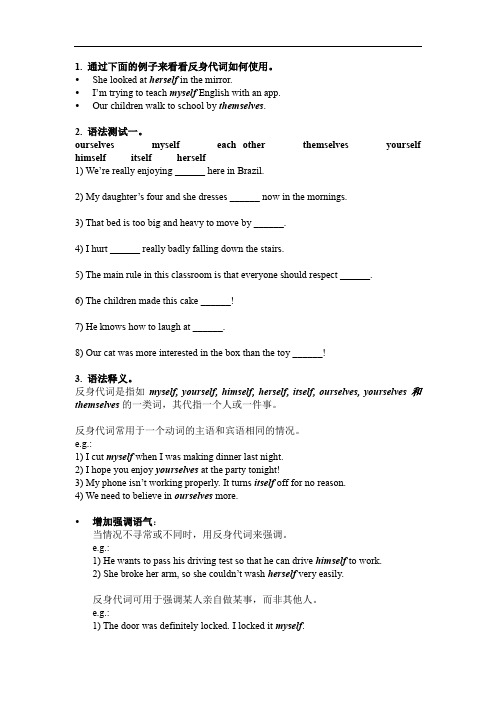
1. 通过下面的例子来看看反身代词如何使用。
•She looked at herself in the mirror.•I’m trying to teach myself English with an app.•Our children walk to school by themselves.2. 语法测试一。
ourselves myself each other themselves yourself himself itself herself1) We’re really enjoying ______ here in Brazil.2) My daughter’s four and she dresses ______ now in the mornings.3) That bed is too big and heavy to move by ______.4) I hurt ______ really badly falling down the stairs.5) The main rule in this classroom is that everyone should respect ______.6) The children made this cake ______!7) He knows how to laugh at ______.8) Our cat was more interested in the box than the toy ______!3. 语法释义。
反身代词是指如myself, yourself, himself, herself, itself, ourselves, yourselves和themselves的一类词,其代指一个人或一件事。
反身代词常用于一个动词的主语和宾语相同的情况。
e.g.:1) I cut myself when I was making dinner last night.2) I hope you enjoy yourselves at the party tonight!3) My phone isn’t working properly. It turns itself off for no reason.4) We need to believe in ourselves more.•增加强调语气:当情况不寻常或不同时,用反身代词来强调。
反身代词

► Collocated
with certain prepositions, reflexives can express special often metaphorical and emotive, meanings eg' ► She was worried about herself, not about him. ► The old man lives by himself. ► The enemy will not perish of himself. ► He was beside himself with joy. 欣喜若 狂 ► How I wish to have a room to myself.
► ►
► ► ► ► ►
a) Reflexives as appositive In emphatic use, reflexives often follow a noun phrase or another pronoun as its appositive to reinforce its meaning. When the reinforced item is the subject of a sentence, the reflexive pronoun may have positional mobility. It may take medial or end position, and even initial position, that is, the position before the subject so as to lend special emphasis. If, on the other hand, the reinforced item is not the subject of the sentence, the reflexive pronoun must directly follow the item it emphasizes. Compare: The manager himself will interview Lucy. The manager will interview Lucy himself. Himself, the manager will interview Lucy. I spoke to the president himself. I like the diamond itself but not the setting. 镶嵌宝 石等的镶座
reflexive的用法

reflexive的用法一什么是reflexive?语法中的reflexive代词指的是指示人或物与作为主语的动词所指向对象相同。
换句话说,当主语以某种方式对自己进行动作时,我们需要使用reflexive代词来表示这种关系。
英语中最常见的reflexive代词是"myself," "yourself," "himself," "herself," "itself," "ourselves," "yourselves"和"themselves"。
二 reflexive在句子中的用法Reflexive代词通常用于以下几种情况:1. 表示自我动作或互相影响的动作:例如,"I hurt myself while playing basketball."(在打篮球时我伤到了自己)这里,reflexive代词"myself"表示主语(即"I")对自己施加了动作(即"hurt")。
2. 强调主体做出的动作:例如,"He cooked the dinner himself."(他亲自做了晚餐)这里,reflexive代词"himself"强调了主语(即"He")亲自做晚餐的事实。
3. 表示某些固定搭配:例如,- "She got herself a new car." (她买了一辆新车)。
这里,“get oneself” 是一个固定搭配,表示某人购买了某物。
- "They enjoyed themselves at the party." (他们在聚会上玩得很开心)。
这里,“enjoy oneself” 表示某人玩得开心。
新编大学德语第一册第九单元
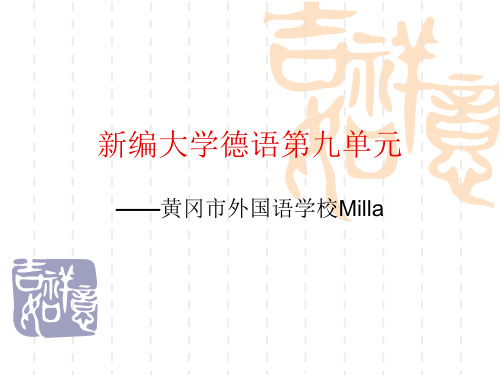
Sie haben Magenprobleme. Sie gehen zum
Facharzt fü r innere Krankheiten
____________.
II Grammatik
Grammatik I Reflexivpronomen und reflexive Verben 1. Das Reflexivpronomen Sg. D A ich mir mich du dir dich er/sie/es sich sich Pl. wir ihr sie Sie
Am nä chsten tag habe ich bis 21.30 Uhr gewartet. Ich habe mich geä ______ rgert. uns Endlich kam sie. Wir haben ______ unterhalten. Plö tzlich kam ein Mann—sehr alt und reich. Er begrü ß t sie. Sie sich haben ______gekü sst. Ich dachte, ich trä ume. Dann hat er sie mitgenommen. sich nicht von mir verabschiedet. Ich habe _____ mich Sie haben ______ betrunken. Am nä chsten Tag habe ich sie wiedergesehen. Sie sich vergnü mich haben ______ gt und gekü sst. Danach habe ich ______ jeden Tag gelangweilt. Herr Groß : Hast du die Geschichte deiner Frau erzä hlt? Herr Klein: Bist du verrü ckt!!!
英语语法之反身代词

presence are the same person or thing, and they match the
gender or nature of that person or thing
Ourselves
Definition
"Ourselves" is a reflective professor that refers back to the group that includes the speaker and at least one other person
01
Overview of reflective pronouns
Definition and characteristics
01
02
Definition: Reflexive proofs are proofs that end in "- self" or "helps" and are used when the subject and object of a verb are the same
Yourselves
Definition
"Yourselves" is a reflexive pronoun that refers back to the group being addressed
Example
"You should all take care of yourself."
Usage notes
Yourself
Definition
"Yourself" is a reflexive pronoun that refers back to the person being addressed It is used when the subject and the object of the presence are the same person
小升初必背英语代词带音标

小升初必背英语代词带音标一、人称代词(Personal Pronouns)- 我:I [aɪ]- 你:you [juː]- 他/她/它:he/she/it [hiː/ʃiː/ɪt]- 我们:we [wiː]- 你们:you [juː]- 他们/她们/它们:they [ðeɪ]二、物主代词(Possessive Pronouns)- 我的:my [maɪ]- 你的:your [jɔː]- 他/她/它的:his/her/its [hɪz/hɜː/ɪts]- 我们的:our [aʊə]- 你们的:your [jɔː]- 他们/她们/它们的:their [ðer]三、指示代词(Demonstrative Pronouns)- 这(近):this [ðɪs]- 那(远):that [ðæt]- 这些:these [ðiːz]- 那些:those [ðoʊz]四、不定代词(Indefinite Pronouns)- 一些:some [sʌm]- 其他的:other [ˈʌðər]- 所有的:every [ˈɛvri]- 任何;一些:any [ˈɛni]- 各自;每个:each [iːtʃ]- 很多;许多:many [ˈmɛni]- 不多(少);几个:few [fjuː]- 其中之一:one [wʌn]- 其中没有一个:none [nʌn]五、疑问代词(Interrogative Pronouns)- 何/什么:what [wɑːt]- 什么人:who [huː]- 什么地方:where [wɛr]- 为什么:why [waɪ]- 什么时候:when [wɛn]- 什么样的…:what kind of [wɑːt kaɪnd ɒv]六、反身代词(Reflexive Pronouns)- 自己;自身:myself [maɪˈsɛlf]- 自己;自身:yourself [jɔrˈsɛlf]- 自己;自身:himself/herself/itself [hɪmˈsɛlf/hɜrˈsɛlf/ɪtˈsɛlf]- 自己;自身:ourselves [aʊərˈsɛlvz]- 自己;自身:yourselves [jɔrˈsɛlvz]- 自己;自身:themselves [ðɛmˈsɛlvz]以上是小升初必背的英语代词带音标。
英语专项代词
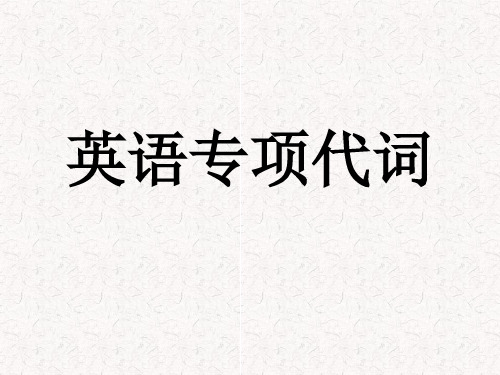
数 格 人称
单数
复数
主格 宾格 主格 宾格
第一人称 I
me we us
第二人称 you you you you
第三人称 he him she her they them
it
it
我是一名学生。 I am a student. 我们都喜欢它。 We all like it. 我、你、和她将乘火车去那。 You,she and I will go there by train. 我们、你们和他们都喜欢音乐。
独自地 by oneself = on one’s own
自学 teach oneself sth. = learn sth. by oneself
自言自语
say to oneself
伤到某人自己 hurt oneself
4. Demonstrative pronouns (指示代词)
• this/ these 时间或空间上较近的人或物; that/ those 时间或空间上较远的人或物。
We,you and they all enjoy music. 单数并列231人称顺序,复数并列123人称 顺序。
若把错误责任担,第一人称要当先。
2. Possessive pronouns (物主代词)
类别 人称 数
第一人称
单 第二人称 数
第三人称
复 第一人称 数 第二人称
第三人称
形容词性 物主代词
表“否定含义” a little “一些” a few”一些”
表“肯定含义”
修 饰 可 数 名 词 复 数
Eg: There is still_a__li_tt_le_milk in the fridge. We
Unit3reflexive+pronouns语法反身代词 牛津深圳版(广州沈阳通用)七年级英语下册

Never leave to others what you ought to do yourself. 不要把自己该做的事留给别人做。
(2) 用作宾语(动词或介词的宾语),来指代主语本身, 和主语是同一人:
eg. Take good care of yourself. 照顾好自己。
Singular reflexive pronouns have the ending -self
_________.
-selves
Plural reflexive pronouns have the ending __________.
4.用法: (1)用作同位语(加强被修饰词的语气,紧放在被
修饰名词后, 或句末),用来强调主语或宾语是独自完成 动作:
Let's do
Look at the pictures below and fill in the blanks with the correct reflexive pronouns.
ourselves
themselves
yourselves
Let's do
myself
herself
Let's do
1. 定义: 反身代词是人称代词的反身形式,即主语发出的 动作最后返回到自身,所以反身代词要与主语一 致。可译为“本人”、“本身”或“亲自”、“自己”。
2.基本形式: oneself
3.构成: 第一、第二人称:形容词性物主代词 + -self 或
-selves,如myself, ourselves, yourself, yourselves; 第三人称:人称代词宾格形式 + -self 或 -selves,
反身动词
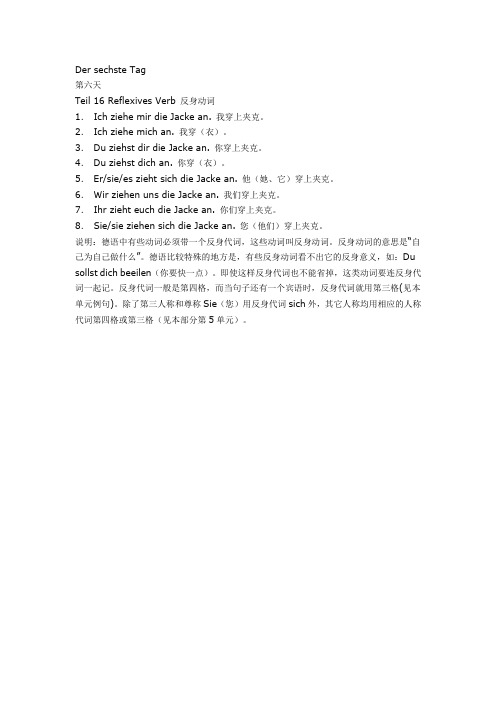
Der sechste Tag
第六天
Teil 16 Reflexives Verb 反身动词
1.Ich ziehe mir die Jacke an. 我穿上夹克。
2.Ich ziehe mich an. 我穿(衣)。
3.Du ziehst dir die Jacke an. 你穿上夹克。
4.Du ziehst dich an. 你穿(衣)。
5.Er/sie/es zieht sich die Jacke an. 他(她、它)穿上夹克。
6.Wir ziehen uns die Jacke an. 我们穿上夹克。
7.Ihr zieht euch die Jacke an. 你们穿上夹克。
8.Sie/sie ziehen sich die Jacke an. 您(他们)穿上夹克。
说明:德语中有些动词必须带一个反身代词,这些动词叫反身动词。
反身动词的意思是“自己为自己做什么”。
德语比较特殊的地方是,有些反身动词看不出它的反身意义,如:Du sollst dich beeilen(你要快一点)。
即使这样反身代词也不能省掉,这类动词要连反身代词一起记。
反身代词一般是第四格,而当句子还有一个宾语时,反身代词就用第三格(见本单元例句)。
除了第三人称和尊称Sie(您)用反身代词sich外,其它人称均用相应的人称代词第四格或第三格(见本部分第5单元)。
反身动词 Reflexive Verben 简称Vr

反身动词Reflexive Verben 简称Vr反身动词是带有反身代词的动词,动词或句子为同一个人或事物,故而反身动词在人称和数量上与主语一致,并取决于动词或介词的支配。
反身代词是人称代词的一种特殊形式,除第三人称和第二人称尊称的单复数为sich外,其他均与人称代词的相应形式相同。
反身动词都是及物动词。
1.真反身动词:反身动词必须与反身代词连用。
sich befinden 位于sich erholen休息sich erkundigen 打听sich schämen惭愧Ich schäme mich wegen dieses Fehlers.2.假反身动词:即可带又可不带反身代词的动词。
带反身代词即为反身动词,不带反身代词即为及物动词。
waschen Vr 洗,洗涤Er wäscht sich.Die Mutter wäscht dem Kind die Hände3.反身代词三四格的变形等同于人称代词三四格的变形其中er es sie Sie 反身代词永远是sich及物动词:加四格的动词四格也叫四格补足语或直接宾语,缩写为A1.V+A动词+第四格Ich mache einen Fehler.2.V+A+D动词+第四格补足语+第三格补足语Ich gebe dir das Buch.3.V+A+präp动词+第四格补足语+介词补足语Er bitte mich um Hilfe.4.V+A+R动词+第四格补足语+方向补足语Er wirft die Schultasche auf das Bett.5.V+A+A动词+第四格补足语+第四格补足语Sie schimpft ihn einen Betrüger.6.V+A+G动词+第四格+第二格这类词很少,常用于法律。
anklagen控告,bezichtigen指责,überführen确证,verdächtigen怀疑Man klagt ihn des Mordes an.Wir bezichtigen ihn des Diebstahls.Die Polizei überführte den Autofahrer der Trunkenheit am Steuer. Wir verdächtigen den Mann der Lüge.不及物动词1.V+Angaben动词+说明语Er bleibe zu Hause.2.V+D动词+第三格补足语Der Mantel gefällt mir.3.V+G动词+第二格补足语Ich bedürfe der Hilfe.4.V+Präp动词+介词补足语China gehört zu den Entwichlungsländern.5.V+N动词+第一格补足语Das ist ein Tisch.6.支配介词补足语Er denkt an die Eltern.Sie glaubt an die Gerechtigkeit.。
reflective的用法

reflective的用法Reflective单词源于拉丁语reflectere,意为“反射”,是一个常用的英文形容词。
在不同的上下文中,reflective可有多种含义和应用。
本文将详细介绍reflective的几种常见用法。
一、指表达思考或自省能力的1. Reflective作为一个形容词,常用来描述一个人或者对象具备思考或自省的能力。
当我们说某人是reflective时,意味着他有能力仔细思考和深入分析问题,并从中获得洞察力和启示。
2. 在教育领域中,reflective还可以指代学生通过反思和整理经验、观点和感受来提高学习效果的能力。
这种自我反思可以帮助学生更好地理解知识,发现不足并改进学习策略。
3. Reflective同时也可以被用来描述一些书籍、文章或研究论文等中表达出的深刻思考和对问题进行全面评论的品质。
这样的作品往往引导读者去思索其中隐藏的信息,并给予他们新的视角和观点。
二、指物体具有反光性质的1. Reflective还可以表示某物体具有反光或折射光线的属性。
这种物体会在光的照射下反射出相应的光线,使物体自身可见或让其他物体受到照亮。
2. 在交通安全中,我们常常可以看到reflective材料被用于制作反光警示标志、衣物和道路标记。
这些材料可以在夜间或低能见度环境下反射车辆灯光,提升行人和驾驶员的安全性。
3. 同样地,在户外运动和摄影领域,reflective设备也经常使用。
例如,反光背心、反光镜头涂层和反光帐篷等产品都能增强远处观察者对人或物体的识别能力。
三、指文学作品中映照现实问题的1. Reflective还可用于形容一些文学作品内融入了深邃含义、丰富哲思或与现实问题相关联的特点。
这类作品往往借助虚构故事或艺术手法来折射并探讨现实生活中存在的困境、价值观或社会问题。
2. 通过欣赏这些reflective文学作品,读者可以从中汲取生活智慧和深度理解,并对自己的思维方式和人生观念进行反思。
反身代词用英语怎么说

反身代词用英语怎么说反身代词是一种表示反射或强调的代词。
反身代词与它所指代的名词或代词形成互指关系,在人称、性质、数上保持一致。
那么你知道反身代词用英语怎么说吗?下面店铺为大家带来反身代词的英语说法,欢迎大家参考学习。
反身代词的英语说法:reflexive pronoun反身代词相关英语表达:英语反身代词 English reflexives汉语简单反身代词 Chinese simple reflexive汉语反身代词 Chinese reflexives反身代词的英语例句:1. Most transitive verbs can take a reflexive pronoun asobject.大部分及物动词可跟反身代词作宾语.2. Reflexive pronouns can be the object of a preposition.反身代词也可作介词宾语.3. Most transitive verbs can take a reflexive pronoun.大部分及物动词可接反身代词作宾语.4. Reflexive pronouns can be direct or indirect object.反身代词可作直接或间接宾语.5. Reflexive pronouns can emphasize a noun or pronoun.反身代词可强调名词或代词.6. As one of the anaphoric devices , English reflexive pronouns have long captured the imagination of linguists.英语反身代词作为“照应”手段之一,倍受各派语言学家的青睐.。
反身动词(真假)
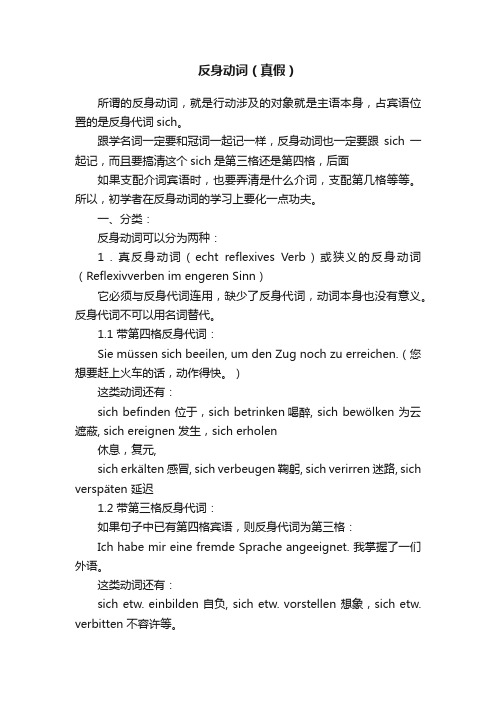
反身动词(真假)所谓的反身动词,就是行动涉及的对象就是主语本身,占宾语位置的是反身代词sich。
跟学名词一定要和冠词一起记一样,反身动词也一定要跟sich一起记,而且要搞清这个sich是第三格还是第四格,后面如果支配介词宾语时,也要弄清是什么介词,支配第几格等等。
所以,初学者在反身动词的学习上要化一点功夫。
一、分类:反身动词可以分为两种:1.真反身动词(echt reflexives Verb)或狭义的反身动词(Reflexivverben im engeren Sinn)它必须与反身代词连用,缺少了反身代词,动词本身也没有意义。
反身代词不可以用名词替代。
1.1 带第四格反身代词:Sie müssen sich beeilen, um den Zug noch zu erreichen.(您想要赶上火车的话,动作得快。
)这类动词还有:sich befinden 位于,sich betrinken喝醉, sich bewölken 为云遮蔽, sich ereignen 发生,sich erholen休息,复元,sich erkälten 感冒, sich verbeugen 鞠躬, sich verirren 迷路, sich verspäten 延迟1.2 带第三格反身代词:如果句子中已有第四格宾语,则反身代词为第三格:Ich habe mir eine fremde Sprache angeeignet. 我掌握了一们外语。
这类动词还有:sich etw. einbilden 自负, sich etw. vorstellen 想象,sich etw. verbitten 不容许等。
2. 假反身动词(unecht reflexives Verb)或反身结构(Reflexive Konstruktionen)原为支配宾语的动词,但为了表示行动涉及自身,就成为反身动词。
英语写作业造句
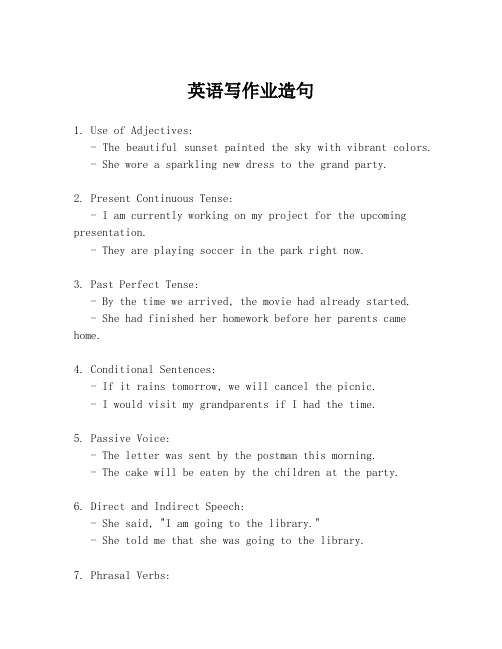
英语写作业造句1. Use of Adjectives:- The beautiful sunset painted the sky with vibrant colors. - She wore a sparkling new dress to the grand party.2. Present Continuous Tense:- I am currently working on my project for the upcoming presentation.- They are playing soccer in the park right now.3. Past Perfect Tense:- By the time we arrived, the movie had already started.- She had finished her homework before her parents came home.4. Conditional Sentences:- If it rains tomorrow, we will cancel the picnic.- I would visit my grandparents if I had the time.5. Passive Voice:- The letter was sent by the postman this morning.- The cake will be eaten by the children at the party.6. Direct and Indirect Speech:- She said, "I am going to the library."- She told me that she was going to the library.7. Phrasal Verbs:- He looked up the word in the dictionary.- She put off her meeting until next week.8. Modal Verbs:- You must complete your homework before you can play.- He could have finished the task if he had tried harder.9. Prepositions of Time and Place:- We are meeting at the station at 5 PM.- The book is on the table.10. Comparative and Superlative Adjectives:- This is the bigger of the two cakes.- She is the most talented singer in the group.11. Noun Clauses:- I don't know what he said.- She asked me where I was going.12. Reflexive Pronouns:- The team needs to reflect on their performance.- He dressed himself quickly and left.13. Articles:- The sun rises in the east and sets in the west.- She bought a book at the store.14. Present Perfect Tense:- I have lived in this city for five years.- They have visited every continent.15. Infinitives and Gerunds:- She wants to travel around the world.- Swimming is one of my favorite activities.16. Countable and Uncountable Nouns:- There are many books in the library.- Water is an uncountable noun.17. Question Formation:- What time does the store open?- Where did you go last weekend?18. Negative Sentences:- I do not agree with your opinion.- She cannot attend the meeting tomorrow.19. Imperative Sentences:- Please close the door behind you.- Do not forget to turn off the lights.20. Relative Clauses:- The man who is standing by the window is my uncle.- The book that I read last night was very interesting.。
【精选】英语中反身代词的讲解与例题41

代词pronoun['prəʊnaʊn]
反身代词reflexive pronoun
• 反身代词代指“自己” • 我自己,你自己,他/她自己,他们/她们自
己
Let’s translate
• 1、I am teaching myself to play the piano. • 2、Be careful with that knife. You might
我们愉快地来个练习!
• 1. Amy makes a card for ( herself ) . • 2. Bad luck!I cut (myself) with a knife. • 3.Wendy and Linda can look after(themselveቤተ መጻሕፍቲ ባይዱ)
very well. • 4.Jane's cat can find food by(itself ) . • 5. Angela loses(hersel)f in the beautiful
cut yourself. • 3、You will hurt yourself. • We are enjoying ourselves very much. • (实义动词后作宾语)
Let’s translate
• 1、I buy an envelope for myself. • 2、Don't only think of yourself. • 3、You should be proud of yourself. • 反身代词用于介词之后
( myself ).”We should not worry about him. • 11.“Danny, can you do it by ()?”
protege5.2介绍

protege5.2介绍OWL本体的重要组成部分Individuals:个体,代表⼀个领域⾥⾯的对象。
可以理解成⼀个类的实例(instances of classes)。
Properties:属性,是两个个体之间的双重联系,它有三个重要的特性(functional、transitive、symmetric)。
Classes:个体的集合,是⼀系列概念的语义表达,和编程语⾔中的类相似,有继承体系。
Class Axiom:类的公理,在验证⼀致性和推理中发挥作⽤。
Class Expression:类的表达,有并、交、补、匿名类等。
Properties:代表⼀种关系relationship。
ObjectProperties,代表了individual之间的⼀种关系;Data Properties,代表了individual和基本数据类型的关系,就像类的属性;AnnotationProperties,属于元数据,数据的数据,可以⽤来解释Classes、Individual、Object / Data Properties。
Properties特性:反(逆)关系:inverse,如⼩张是⽼张的⼉⼦,那么反关系中⽼张是⼩张的⽗亲。
函数关系:functional,如⼩张最好的朋友是李四,⼩张最好的朋友是⼩⾖⼦,那么李四和⼩⾖⼦等同。
对等(对称)关系:symmetric,指的是properties的对等性,是2个individual和1个properties,如⽼李与⽼张是邻居,与上⾯的inverse是2个individual和2个properties,⼩张是⽼张的⼉⼦,⽼张是⼩张的⽗亲。
传递性:transitive。
⾮对称关系:asymmetric,如反关系中的,⼩张是⽼张的⼉⼦,不可能⽤对称关系说⽼张是⼩张的⼉⼦。
⾃反性:reflexive,即将⼀个properties指向⾃⾝,如⼩张知道⼩李,⼩张知道⾃⼰。
⾮⾃反性:irreflexive,如“是⼉⼦”就⾮⾃反,⾃⼰不会是⾃⼰的⼉⼦。
- 1、下载文档前请自行甄别文档内容的完整性,平台不提供额外的编辑、内容补充、找答案等附加服务。
- 2、"仅部分预览"的文档,不可在线预览部分如存在完整性等问题,可反馈申请退款(可完整预览的文档不适用该条件!)。
- 3、如文档侵犯您的权益,请联系客服反馈,我们会尽快为您处理(人工客服工作时间:9:00-18:30)。
Dormir vs Dormirse
The verb forms are the same: duermo, duermes, duerme, dormimos, duermen The difference in form is the addition of the reflexive pronouns: me, te, se, nos, se The difference in meaning is:
Does this look familiar?
What’s going on here?
yo me llamo tú te llamas él se llama nosotros nos llamamos ellos se llaman The verb endings are the usual ones.
And your point is…?
Lavo la ropa, lavo los platos, lavo el coche, lavo las ventanas. Me lavo las manos, me lavo el pelo, me lavo la cara. If you are washing something that is attached, you need to add the word “me.”
I wash my clothes, I wash the dishes, I wash the car, I wash the windows. I can wash things that are not part of me, that is, not attached to my body. In Spanish, we say, “Lavo la ropa, lavo los platos, lavo el coche, lavo las ventanas.”
Some examples
I wash my clothes, I wash the dishes, I wash the car, I wash the windows. I wash my hands, I wash my hair, I wash my face.
What’s the difference?
Levantarse
yo me levanto tú te levantas él se levanta nosotros nos levantamos ellos se levantan This verb has regular endings.
Sentarse (e > ie)
yo me siento tú te sientas él se sienta nosotros nos sentamos ellos se sientan This verb is stem-changing.
Hint: not all the verbs in this paragraph are reflexive!
A morning routine
Todos los días, yo me levanto a las 7:00. Voy al baño, me lavo la cara, y me afeito. Luego me visto y tomo un poco de desayuno. Por fin, me lavo los dientes. Did you remember to use a reflexive pronoun with levanto, lavo, afeito, and visto? Did you remember to change the stem for visto?
… and…
I wash my hands, I wash my hair, I wash my face. I also wash things that are attached to my body – hands, face, hair (unless you wear a toupee!). In Spanish, we say, “Me lavo las manos, me lavo el pelo, me lavo la cara.”
Estoy lavándome el pelo Estamos lavándonos el pelo Me estoy lavando el pelo Nos estamos lavando el pelo
Whew! That’s a lot to remember!
True! But keep in mind that the verb changes as it always does. You just have to remember to use the reflexive pronoun if you see an infinitive that ends in –se. You’re now ready to move on to regular preterite verbs.
Huh?
There are two ways to talk about washing in Spanish:
Lavar: to wash something else Lavarse: to wash part of one’s body.
Lavarse
Here are the forms:
Brillante!
yo me llamo tú te llamas él se llama nosotros nos llamamos ellos se llaman The only difference is that we have to add the reflexive pronoun (before the verb).
Reflexive verbs
In this presentation, we are going to look at a special group of verbs called reflexives. Let’s start out by thinking of the English verb wash. List several things that you can wash.
Dormir: to sleep Dormirse: to fall asleep
Reflexive verbs often have a special meaning, such as ‘change in condition’ – from being awake to being asleep.
What about progressives?
Remember that progressives are also two-part verb combinations:
Estoy comiendo Estamos escribiendo
Refelxive pronouns can go before or after the
Juana ______ (despertarse = e > ie) a las 6:30, ________ (levantarse), ______ (ir) al baño, y ________ (ducharse). Ella ______ (secarse), _______ (peinarse), y _______ (pintarse) la cara.
Other things to remember
If you use certain two-part verb combinations, the reflexive verb can either before the first verb or can be attached to the second verb. Querer + levantarse
Dormirse
yo me duermo tú te duermes él se duerme nosotros nos dormimos ellos se duermen This is another stem-changing verb.
Ponerse
yo me pongo tú te pones él se pone nosotros nos ponemos ellos se ponen This –go verb changes as usual.
Okay, how about some more reflexive verbs?
Levantarse: to get/stand up Sentarse (e > ie): to sit down Dormirse (o > ue): to fall asleep Ponerse (-go): to put on an article of clothing
me lavo te lavas se lava nos lavamos se lavan
The “me, te, se, nos, se” forms are called reflexive pronouns.
How do you get those forms?
The infinitive has a –se attached to it to show that the subject is doing something to him/herself. Drop the –se. Change the verb as usual. Put the appropriate reflexive pronoun in front of the verb.
A morning routine
Todos los días, yo ______ (levantarse) a las 7:00. ______ (ir) al baño, _______ (lavarse) la cara, y _______ (afeitarse). Luego ______ (vestirse = e > i) y ______ (tomar) un poco de desayuno. Por fin, _______ (lavarse) los dientes.
